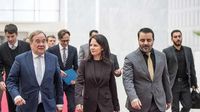German Foreign Minister Annalena Baerbock visited Syria on March 20, 2025, marking her second visit to the country since the ousting of Bashar al-Assad in late 2024. Baerbock, who flew in by military aircraft, was accompanied by Armin Laschet, a member of the German parliament from the CDU. The visit came on the heels of a violent outbreak in northwestern Syria two weeks prior, which resulted in the deaths of hundreds of civilians.
Upon her arrival in Damascus, Baerbock was greeted at the entrance of the palace by Foreign Minister Asaad Hassan al-Schaibani, who offered her a handshake—a notable contrast to her earlier visit in January, during which she was not offered a handshake by President Ahmed al-Scharaa.
Despite the change in tradition, a stark moment occurred when Baerbock met Scharaa. In a notable departure from standard diplomatic protocol, he again placed his hand on his heart but did not shake her hand. According to reports from various news agencies, this custom is rooted in Islamic male etiquette, which generally prohibits men from shaking hands with women unless they are closely related.
The day’s agenda included talks with the Syrian transitional government and various civil society representatives. Baerbock emphasized the importance of dialogue during her visit, aiming to strengthen Germany's diplomatic presence in the region. "A political new beginning between Europe and Syria is possible," she stated, adding that Germany could play an active role in stabilizing the country.
One significant outcome of the trip was Baerbock's announcement regarding the reopening of the German embassy in Damascus, which had been closed since January 2012 due to the civil conflict. While the embassy will resume operations, visa and consular matters will continue to be managed from Lebanon due to ongoing security concerns.
Baerbock signaled the conditions under which Germany would offer humanitarian aid and ease sanctions on Syria, describing it as contingent on the government's commitment to ensuring freedom, security, and equal opportunities for all citizens, irrespective of gender or religion. She noted, "There are clear expectations that freedom, security, and opportunities in Syria must apply to all people—women and men, followers of all ethnicities and religions."
In December 2024, Syria’s long-time ruler, Bashar al-Assad, was toppled by a rebel alliance primarily composed of Hayat Tahrir al-Sham (HTS), a group that has now assumed control of the country. This transition has not led to peace within the nation; rather, it has seen fresh brutality emerge. The recent violent flare-up in early March has been attributed to clashes between supporters of the ousted Assad regime and the transitional government, resulting in approximately 1,500 deaths, with a significant number being innocent civilians.
The Syrian Observatory for Human Rights has described these events as near "massacres," noting that the violence largely targeted Sunni populations in the western coastal regions, an area significantly affected by the ongoing conflict. The transitional government reacted with considerable military force, seeing the assaults as attempts to spark another civil war.
As Baerbock concluded her official activities in Syria, she reiterated Germany’s commitment to helping stabilize the nation, albeit with caution following recent tragic events. Her visit has been portrayed as trying to lay the groundwork for a new phase in Germany’s approach to the conflict-ridden region, one that acknowledges the complexities and challenges that lie ahead.
With her diplomatic efforts, Baerbock aims not only to reshape the narrative around Germany's involvement in Syrian affairs but also to demonstrate a renewed willingness to engage with the transitional government to foster peace and development. As she left, she was beset by questions about the implications of her visit in the broader context of European involvement in Syria.




